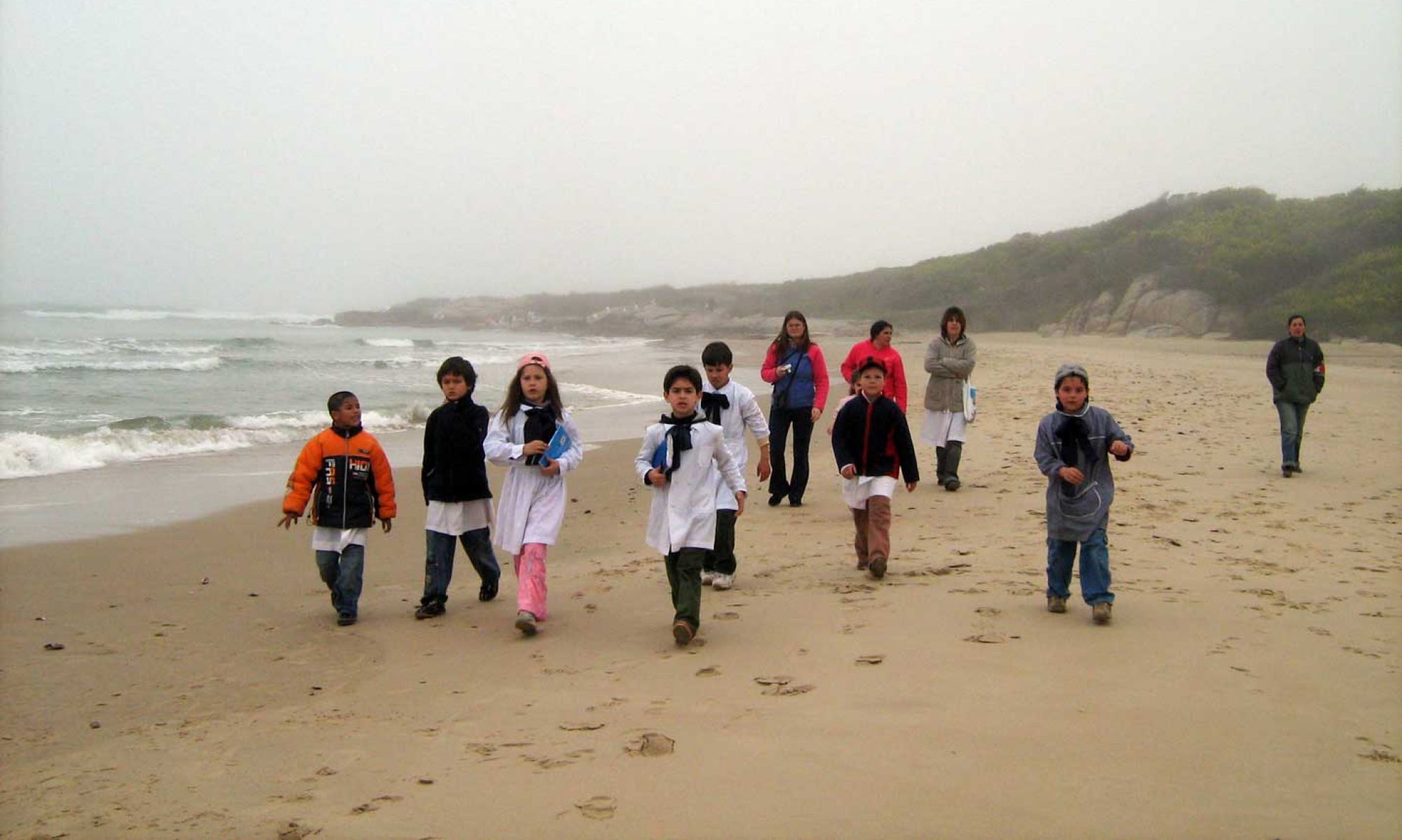The team of YAQU PACHA Latin America – South America
Prof. Eduardo Secchi
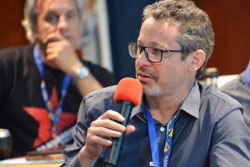
In 1989 I was in the second year of my studies in oceanography and I decided to dedicate myself to the study of marine mammals in South America. At the end of 1991, I graduated from the Universidade Federal do Rio Grande FURG (Federal University of Rio Grande) in Rio Grande, southern Brazil. From 1991 to 1999, I was head of the Marine Mammal Laboratory at the "Museu Oceanográfico" (Oceanographic Museum) of FURG. Since 1992/93 I have been leading a long-term project to assess the impact of bycatch on the Franciscana dolphin. Both my master's degree (1999 at FURG) and my PhD (2006 at the University of Otago in New Zealand) and my postdoctoral fellowship at Flinders University (Australia – 2014) focused on the population dynamics and viability of the Franciscana. For this research, I was awarded the first prize for the best research paper on the protection of aquatic mammals in South America in 2000 and the Oliver Peason's Award of the American Society for Mammalogy in 2007. In parallel, I have led several research projects on the ecology and conservation of other marine megafauna species and their ecosystems in Brazil and Antarctica. These medium- and long-term projects have resulted in more than 160 publications in peer-reviewed journals and many other non-peer-reviewed papers. These publications provided input on genetics, population dynamics, fisheries interactions, stock identity, modelling and other areas relevant to the conservation of these species and their habitat. My medium-term goal is to propose measures to reduce the impact of fishing-related mortality on the fate of Franciscana and other coastal whale populations and bottlenose dolphins , while enabling local communities to secure their livelihoods through responsible use of natural resources (in this case, fish). My long-term goal is to better understand the dynamics, habitat requirements and threats of other marine megafauna species and to identify trends in the Franciscana dolphin and other species. My ultimate goal is to build capacity in the field of human resources. Since 2006 I have been a professor at the Institute of Oceanography at FURG. I also head the Laboratory of Ecology and Conservation of Marine Megafauna (ECOMEGA) at the same university, where I supervised several undergraduate, master's, doctorate and post-doctoral students from Brazil, Argentina and Uruguay. From 2002 to 2007, I was editor-in-chief (now editor emeritus) of the Latin American Journal of Aquatic Mammals and serve as an ad hoc reviewer for many scientific journals in Brazil and abroad. I was president of the Latin American Society of Aquatic Mammals – SOLAMAC (2015-2016). I have been a member of the Cetacean Specialist Group of the International Union for Conservation of Nature (IUCN) since 1997, Level 1 Research Fellow of the Brazilian Council for Scientific and Technological Development, Deputy Rector for Research and Graduate Studies at FURG since 2017, and currently Chair of the Conservation Committee of the Society for Marine Mammalogy.
Dr. MSc. Juliana Couto Di Tullio
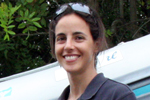
Juliana is a biologist and has been researching marine mammals in South America since 2002. During her studies, she participated in various expeditions to Antarctica to study the ecology of elephant seals and the distribution of stranded beaked whales in the Southwest Atlantic, which was also the subject of her monograph. Juliana completed her Master's degree in Biological Oceanography at the Universidade Federal do Rio Grande (FURG), Brazil, where she studied the habitat use of bottlenose dolphins and the possible overlaps with artisanal fisheries in the Patos Lagoon estuary and coastal areas. She is currently working on the Bottlenose dolphins project and is also involved in a humpback whale project in Antarctica. Since 2009, Juliana has also been working on a new project that aims to describe the distribution of marine mammal species and their relationship to oceanographic variables on the continental slope in southern Brazil. She has experience in photo identification, biopsy, distance measurement, and GIS analysis.
Lília Fidélix
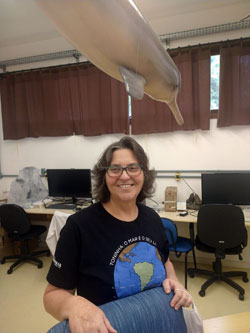
Lília Fidélix, has a degree in Environmental Management.
She started in 1996 as a volunteer with the Toninhas Project, or Franciscana, and living in the fishing community of Barra in Brazil, she became the link between the university and the fishermen. After 3 years, she joined the Ecomega FURG Group, where she has been working as a laboratory technician for 27 years. Since 1999, she has been financially supported by YAQU PACHA to work in the laboratory and participate in all activities, whether it is monitoring the beaches, monitoring the fishing fleet in the Toninhas project, participating in all the projects of the laboratory, providing logistical support or participating in the practical activities.
Dr. Pedro Fruet
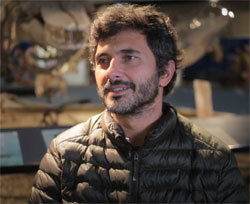
Dr. Pedro Fruet is a biologist and has been working in marine mammal research and conservation in South America for more than 20 years. He is a co-founder of the non-governmental organization Kaosa (local NGO based in southern Brazil) and since 2014 he has been head of research at the Marine Mammal Laboratory of the Oceanographic Museum of Rio Grande, as well as a member of the ECOMEGA laboratory (Federal University of Rio Grande). He is currently Minister of the Environment of the City of Rio Grande and President of the Municipal Environmental Council COMDEMA. Pedro graduated in biology in 2004 and completed his master's degree in biological oceanography at FURG (2008), the Federal University of Rio Grande. He earned his PhD in Biological Oceanography in 2014 as part of a joint teaching program between the Federal University of Rio Grande (FURG) and Flinders University of South Australia. He was a research fellow at the National Center of Aquatic Mammals, ICMBio/Ministry of Environment (GEF-Mar program) for two years (2017-2019) and a postdoctoral research fellow at the Institute of Oceanography – FURG between 2019 and 2020. Pedro has been a Brazilian delegate to numerous meetings of the Scientific Committee of the International Whaling Commission (IWC) and has also been a PNUD advisor (in collaboration with the Brazilian Ministry of the Environment) in reviewing and updating the proposal for the South Atlantic Whale Sanctuary within the framework of the IWC. He is the coordinator of the Task Team for the Lahille's Bottlenose Dolphin, which was confirmed by the IWC in 2020. In 2021, Pedro was awarded the Whitley Award for his remarkable contribution to the long-term research and conservation of Lahille's bottlenose dolphin in South America. In 2022, he was accepted as a member of the Regular Process for Global Reporting and Assessment of the State of the Marine Environment, including Socio-Economic Aspects, under the auspices of the United Nations.
Its tasks include the coordination of research groups. Development of management plans and research and conservation initiatives for dolphins at national and international level. Expertise includes environmental education, population dynamics of dolphins and marine mammals, genetics, ecology, as well as capacity building and fundraising for research and conservation. Pedro holds talks with locals and the government, as well as environmental NGOs to develop strategies for the sustainable use of coastal regions.
Yurasi Briceño
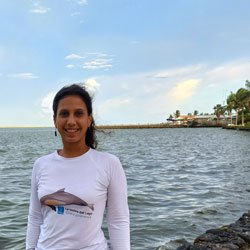
Biologist and currently PhD student in ecology with a diploma in protected area management. Since 2005, I have dedicated myself to academic training in the study of whales and dolphins in South America. I received training in biology, ecology and care of stranded animals and the toxicological analysis of these species. I have coordinated and led workshops on whales and dolphins in Venezuela. I am currently leading the Sotalia Project, which is dedicated to the promotion, research and protection of marine mammals in Venezuela. Special emphasis is placed on highly endangered species such as Sotalia guianensis, Inia geoffrensis and Trichechus manatus manatus at the regional level. I have promoted education and dissemination campaigns for these species at the regional and national level through infographics, children's books, workshops and courses. I trained in programs such as Distance Sampling, Geographic Information System, and others. As professional divers and through the Sotalia project, we work with other national organizations to remove ghost nets and debris from coral reefs in key aquatic mammal ranges. Thanks to the support of international organizations such as YAQU PACHA e.V., Fundación Omacha, PADI Foundation, Cetacean Society International and Ocean Care, I have been able to design projects to estimate distribution and abundance, analyze threats, assess heavy metals, and restore habitats of the Guyana dolphin, the Amazon dolphin, and the manatee in Lake Maracaibo and the Orinoco Basin. conduct. These results have been presented at international congresses, symposia and in scientific articles. I am a member of the Conservation Biology Society, the Latin American Society of Aquatic Mammal Specialists , and the South American River Dolphin (SARDI) Initiative for Venezuela.
Camilah Antunes Zappes
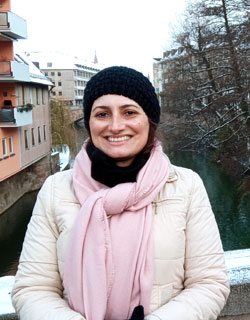
Camilah Antunes Zappes is a biologist, PhD ecologist, professor at the Federal University of Espírito Santo in southeastern Brazil and coordinator of the research group ECOLOGIA HUMANA DO OCEANO. Her research areas include the human dimension, which deals with human ecology, ethnobiology and ethnoecology of marine fauna, socio-ecological oceanography and environmental education.
The ECOLOGIA HUMANA DO OCEANO group, which she coordinates, is made up of researchers from universities, research institutes and the Brazilian government. The group's goal is to understand environmental issues by linking scientific knowledge with the traditional knowledge of communities living on the Brazilian coast. Based on research, researchers and community stakeholders work together to propose solutions to environmental problems.
YAQU PACHA works with this group in South America by funding environmental awareness projects. Projects are carried out in primary schools, with children who are patients in public hospitals and in traditional communities in Brazil. It also supports ethnoecological and ethnobiological research on dolphins and small cetaceans conducted with artisanal fishing communities on the Brazilian coast.
Prof. Paul Kinas
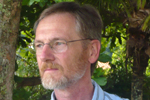
Paul G. Kinas is a biologist and oceanographer with a PhD in statistics (UBC, Canada) and has been a lecturer in applied statistics for undergraduate and graduate students at the Universidade Federal do Rio Grande (FURG) in Brazil since 1980. His research interests focus on Bayes statistical modelling to solve problems in population ecology, conservation biology and animal behaviour.
Biol. Marjorie Fuentes
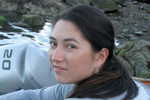
Marjorie is the Chilean project coordinator of the project "Small Whales of Chiloé" in southern Chile. She graduated with a first-class degree in Marine Biology from the University of Valparaiso and is currently pursuing a Master's Degree in Wilderness and Nature Conservation at the University of Chile in Santiago. Marjorie has been involved in research into the ecology and behavior of Chilean dolphins, Peale's dolphins and Burmeister's bottlenose dolphins since December 2002, first as a field assistant, and since 2007 as a coordinator for fieldwork and volunteers. She also leads the environmental education campaign "Discovering the Marine World", which has been carried out with great success in more than a dozen urban and rural schools in the south of Chiloé. She is currently an active member of the coastal management plan working group in South America and has submitted a proposal for protected areas based on the results of the YAQU-PACHA project.
Roke Rojas
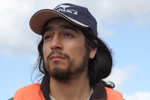
Roke is a marine biologist at the Universidad Austral de Chile. For the past four years, Roke has worked as a researcher in the "Pequeños Cetaceos de Chiloe" project, which investigates the ecology of Chilean dolphins, Peale's dolphins and Burmeister's bottlenose dolphins in the Chiloe Archipelago in southern Chile. He was also involved in studies to characterize the acoustic signals of these species, an area that became his thesis. Roke is an experienced taxidermist and uses this skill, combined with his knowledge of aquatic mammals in South America, to develop environmental education programs for schools and university students. As part of a postgraduate program, Roke would like to deepen his experience in bioacoustics.
Dr. Biol. Juan Valqui
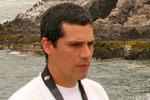
Juan is the director of Projecto Lontra felina, which coordinates activities to protect the endangered sea otter in Peru. His participation in the studies carried out in Peru on the little-known species Lontra felina has already earned him the title of marine otter specialist. Since 2009, he has been part of the South America team with his doctoral thesis, a population genetic study of the sea otter in Peru. In his field work, he organises workshops in which the school children – future fishermen – receive information about the importance of nature conservation and environmental protection.
Dr. Carolina Abud
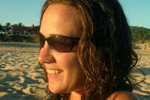
Carolina is one of the founding members and co-directors of the research and conservation group Team Cetáceos Uruguay. She started the Franciscana project in 2004 and has been involved in it ever since, mainly dealing with the bycatch of Franciscana (Pontoporia blainvillei) in small-scale fisheries. She has been working on the geographical genetic structure of Franciscana, which is also one of her current interests. She is now an MSc. student and her dissertation focuses on the study of genetic variation and geographical genetic structure.
Dr. Paula Costa Urrutia
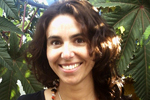
Paula is one of the founding members and co-directors of the research and conservation group Team Cetáceos Uruguay. She is co-director of the Francaaustral project, which studies the behaviour and distribution of southern right whales (Eubalaena australis). Since 2004, she has also been involved in the Franciscana project, which deals with the bycatch of the Franciscana dolphin (Pontoporia blainvillei) in artisanal and industrial fisheries. She is currently working on conservation genetics. She has worked on the social and geographical genetic structure of Franciscans (master's thesis), and as a PhD student she studies the population genetics and mating system of blue whales.
Caterina Dimitriadis
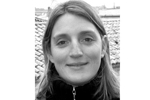
Caterina is one of the founding members and co-directors of the research and conservation group Team Cetáceos Uruguay. She has been involved in the Franciscana project since the beginning and deals with the bycatch of the Franciscana dolphin (Pontoporia blainvillei) in artisanal fisheries. Since 2005, Caterina has also been co-director of the project entitled "Diet of the franciscana dolphin in the Uruguayan coast". Caterina is a PhD student at the University of Girona (Spain) and is writing her PhD thesis on artisanal fisheries and marine protected areas in Palamos (north-western Mediterranean).
Dr. Valentina Franco-Trecu
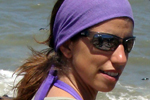
Valentina is one of the founding members and co-directors of the research and conservation group Team Cetáceos Uruguay. She began her work on Uruguayan seal populations in 2004, focusing on maternal behavior. For five years, she studied mating behavior, feeding habits, reproductive success, and interaction with fisheries in the Uruguayan rookery. She is currently co-director of the Franciscana project, which deals with the bycatch of Franciscana (Pontoporia blainvillei) in artisanal and industrial fisheries. She is also co-director of the project "Nutrition of the Franciscana dolphin off the coast of Uruguay". She has a master's degree in biology and her thesis was titled "Reproductive success and nutrition of Arctocephalus australis females and their trophic relationship with Otaria flavescens in Uruguayan waters".
Dr. Paula Laporta
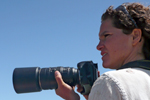
Paula is one of the founding members and co-directors of the research and conservation group Cetáceos Uruguay. She currently holds a master's degree in biological oceanography. She is the director of the Toninas project, an ecological and behavioral study of the bottlenose dolphin (Tursiops truncatus) on the Uruguayan coast. Since 2004, she has also been a member of the Franciscana Project, which deals with the bycatch of the Franciscana dolphin (Pontoporia blainvillei) in artisanal and industrial fisheries in South America. Next year, she will start her doctoral thesis and continue the study on the bottlenose dolphin in a coordinated regional framework. Since the inception of Team Cetáceos Uruguay, she has been working on its environmental education program and is currently coordinating the YAQU PACHA Arenas project, which is aimed at teachers along the Uruguayan coast.
Dr. Cecilia Passadore
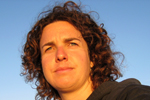
Cecilia is one of the founding members and co-directors of the research and conservation group Cetáceos Uruguay. She is a master's student researching the interactions of marine mammals with Uruguayan pelagic longline fisheries in the Southwest Atlantic, with a focus on bycatch, prey capture and distribution of orcas (Orcinus orca). Since 2006, it has been part of the Franciscana Project, which deals with the bycatch of the Franciscana dolphin (Pontoporia blainvillei) in artisanal fisheries. She also leads a project on the distribution of whales and dolphins in Antarctic waters, which is part of the Census of Antarctic Marine Life. Since the founding of Cetáceos Uruguay, she has been working on its environmental education program and is currently coordinating the YAQU PACHA Arenas project, a project aimed at teachers along the Uruguayan coast.
Dr. María Nube Szephegyi
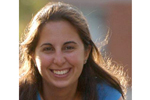
María is one of the founding members and co-directors of the research and conservation group Team Cetáceos Uruguay. She is currently an MSc. student and is working on her dissertation on the distribution of the Franciscana dolphin (Pontoporia blainvillei) as a function of environmental variables. Since 2006, she has been part of the YAQU PACHA Franciscana project, which deals with bycatch in artisanal and industrial fisheries. She is also part of the environmental education program of Cetáceos Uruguay and coordinates the Team Arenas project, a project aimed at teachers along the Uruguayan coast.
The employees of the Latin America – South America team do not receive a salary from YAQU PACHA, but targeted project support for the implementation of species conservation projects.
